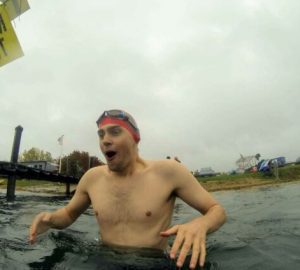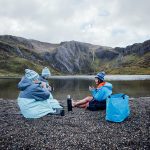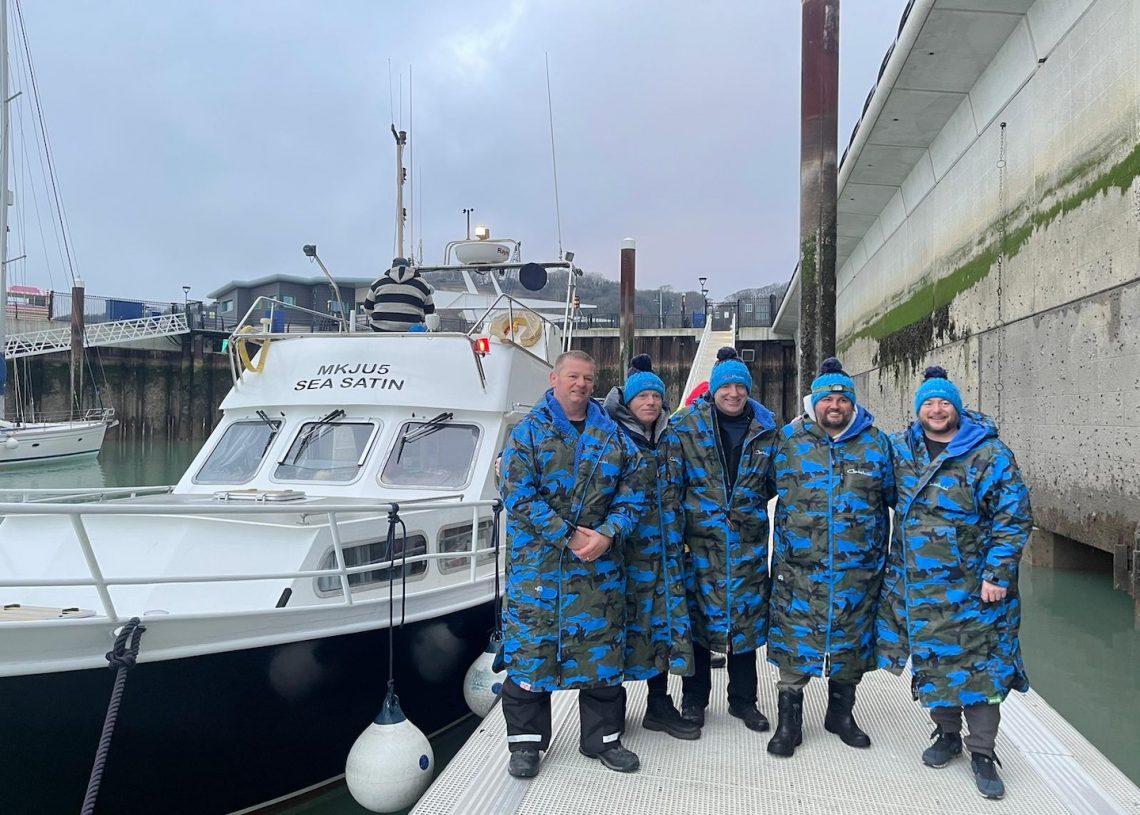
Breakthrough winter relay in the English Channel
Fresh from his team’s record-breaking relay in the English Channel, ice and endurance swimmer John Myatt spoke to us about how they battled the cold and choppy conditions to make it to France
Several possible new records have been set in the English Channel this month – the first ever 5-man winter English Channel relay crossing, which is also the earliest English Channel swim in any calendar year since records began. It’s also believed to be the coldest ever conditions for an English Channel relay (ratification pending).
On a bitterly cold 13 January, a team of endurance swimmers including Ger Kennedy (IRE), John Myatt (ENG), Vincent Donegan (IRE), Stève Stievenart (FR) and Lee Johnson (ENG), braved the icy waters of the English Channel, enduring temperatures as low as 7°C in the water and barely above freezing in the air. They rotated through one-hour shifts with unwavering determination and after 14h, 45m they emerged victorious at Cap Griz-Nes on the French coast.
During the swim no wetsuits were allowed – swimmers could only wear one pair of approved togs, goggles, ear plugs and one swim cap.
A five-person women’s team also undertook the challenge but were forced to abandon due to issues with their boat.
Fresh from the winter relay, John Myatt spoke to us about how he and his teammates battled the cold and turbulent conditions to make it to France, raising money and awareness for animal welfare charity Power of One UK.
John, tell us about what was involved to qualify for the swim.
Qualification included completing a 90-minute swim in water below 10°C, followed by a recovery period of up to 90 minutes before re-entering the water for an additional 60 minutes. It proved to be a challenging qualifier, testing our capacity to recover and swim again, particularly given the penetrating cold that reaches deep into the core.
What’s involved in ‘recovery’ between the swims?
It consists of getting all your dry clothes back on and doing squats (calisthenic exercises) to engage the big muscles and get the blood pumping and body re-warmed. And of course having some warm food and drink to re-fuel before getting back in the water again.
Because I was lacking bioprene (fat) I had to use everything I could to warm myself back up. I had a water-wicking top, a heated gilet, then a coat, then double dry robes! Plus hand warmers. I utilised everything I could to keep warm.
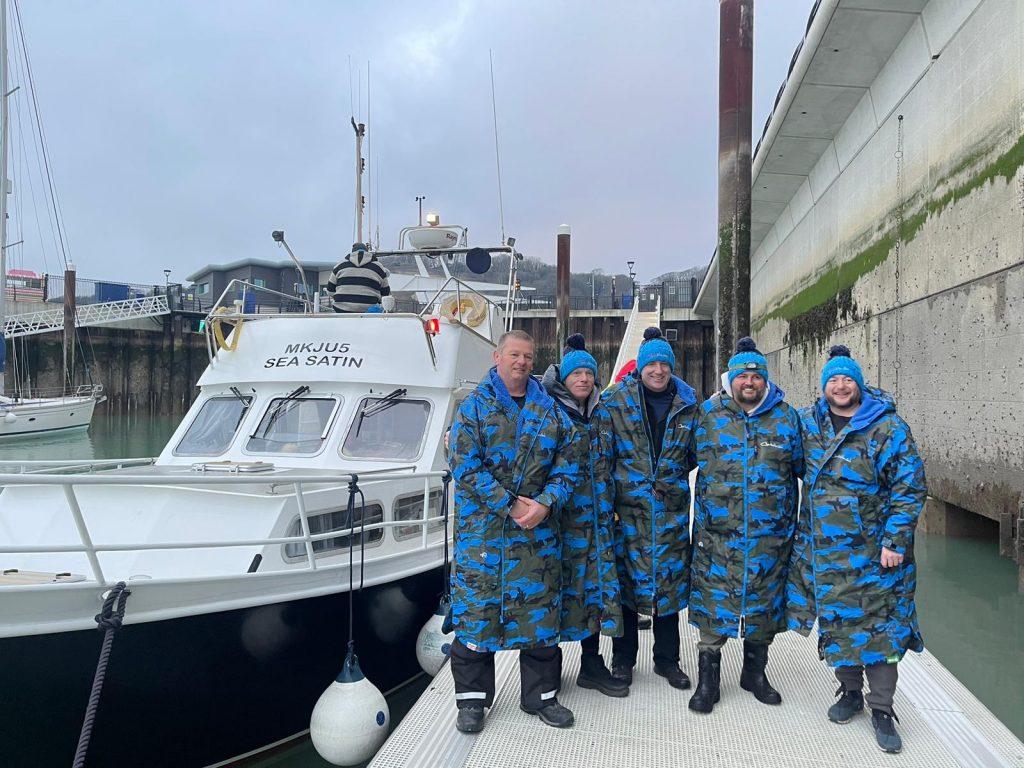
Tell us about your team mates.
Let me introduce you to our incredible team: Ger Kennedy, Vincent Donegan, Lee Johnson, and Stève Stievenart. Prior to the swim, I had only crossed paths with Ger at some ice swimming competitions. I hadn’t met the entire team until the morning of our endeavor. Yet, upon researching them beforehand, I was struck by the remarkable backgrounds we all shared, indicating that we were destined to form a formidable team. From the moment we assembled, there was an instant rapport among us. It felt natural, as if we had been teammates for years. We bonded effortlessly and provided unwavering support to one another right from the start.
How did you prepare for the Channel relay?
I mainly swam at Sandford Parks Lido in Cheltenham which, due to the uptake of winter swimming, has fortunately been open for the last few winter seasons. I also regularly travelled to Clevedon Marine Lake. It’s hard training inland in winter because you’ve got to try to find the right kind of cold temperatures which enable you to swim between 7-10°C for longer durations.
As the air temperature dropped I found it harder to train for longer durations as the shallow water would react quickly and temperatures would plummet below 5°C overnight. This made it ideal for Ice training, as I was also training for the GB Ice swimming championships, but not so great for cold water distance training.
My other go to for winter training is an ice barrel that I’ve got in the garden which I top up with ice from and industrial ice machine, this really helps by reducing my cold water shock response. I compete in ice swimming competitions so I’m a big believer in getting in the ice almost daily. Normally I dip minimally for six minutes, sometimes a lot longer, as even short dips help lower your cold shock response, so your heart rate doesn’t jump up and you’re able to breathe straight away. You have to keep up your acclimation and constantly adapt to the cold to take part in challenges like this.
What were the conditions like for your challenge?
Securing a suitable weather window proved to be a significant challenge. There were instances where we waited for months only to find that the weather conditions were still not optimal for the swim. When undertaking a Channel crossing, it’s imperative to avoid excessively choppy and windy conditions.
On the day of our swim, despite forecasts suggesting a temperature of 5°C, it turned out to be even colder, fluctuating between a biting 1 to 3°C. A doctor on board monitored the surface water temperature, which ranged from 7 to 9°C – undeniably cold conditions
Personally, I had concerns about being the weak link in the team as I had lost weight over the past year. Despite doubling my food intake during Christmas in an attempt to regain weight, I struggled to put much back on.
During my turn in the rotation, I quickly began to feel the onset of mild hypothermia 40-45 minutes into each swim. Although I was still swimming adequately, I could sense the cold affecting my limbs and breathing, slowing my pace. The sea conditions resembled a turbulent washing machine, making it challenging to establish a steady rhythm. Although the waves weren’t particularly large, their varied directions added to the difficulty.
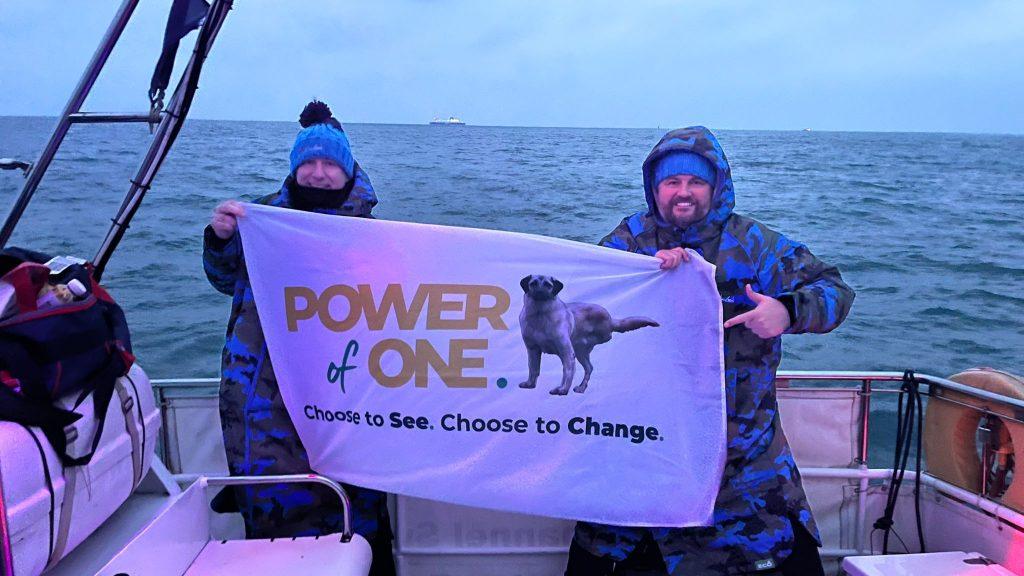
And it was you completed the swim?
Yes, I was the last one. I recall being below deck, staying warm, and observing the others returning from their third rotation. They looked colder than ever before. Ger insisted I go above deck to shield me from witnessing the condition of each swimmer coming aboard. I think he was worried it might affect me psychologically for my next swim, especially since I was enduring the most discomfort. However, witnessing their challenging recoveries motivated me to focus on completing my own swim.
The moment I entered the water in the black of night, I felt the biting cold. Yet, in that state of exhaustion and chill, my focus sharpened on the task ahead. I concentrated on maintaining a fast pace, I was really zoned in knowing that I could finish this. Drawing from past experiences in cold water swims, I used those memories as motivation.
Twenty minutes into the swim, I was handed a warm drink on a string – my inaugural feed in the Channel. However, the choppy waters caused me to accidentally ingest sea water, prompting me to question its purpose.
As I approached the finish point at Cap Gris-Nez, the waves crashed violently against the rocky coastline. I navigated cautiously, ensuring I didn’t get swept into the rocks. Eventually, I managed to manoeuvre past some partially submerged rocks and onto a boulder. Standing up, clearing the water, I heard the boat’s siren signalling the finish. I later learned there was much celebration and excitement on the boat, but at that moment, I was led down on the RIB, shielded by my Charlie McCleod robe, trying to stay warm!
How did you all feel knowing you’d completed the relay?
Our celebrations were quite muted because the women’s team couldn’t complete their swim as the sea anchor drogue got fouled with both engine propellers. Two of the women treaded water in the bitter cold for one hour each to keep their hopes alive, but the diver was only able to free one propeller after two hours, so the swim had to be aborted and the boat limped back to port. It must have been a dreadful experience.
Additionally, within 5k of where we finished, we learned that a boat carrying migrants capsized, resulting in the tragic loss of six lives. The water conditions were extremely harsh; I can only imagine the fear and difficulty for those who were in the water.
Therefore, it’s easy to understand why our celebrations were subdued.
Despite everything, now that it’s all over, I feel a sense of relief and a desire to celebrate. I’ve been away from work for five months due to depression and anxiety. The pressure of training for both the GB ice swimming championships and this Channel swim was immense, so completing it feels like a significant achievement.
Nevertheless, it was such a rewarding experience swimming alongside such great individuals, which i’m very proud of, and for accomplishing something that had never done before. You are only as great as the sum of all parts and through our experience we have formed a lasting bond.
I want to express my sincere gratitude to our pilot, Lance Oram, whose expertise and understanding of the tides guided us to the finish line. Also, a big thank you to Charlie McLeod for sponsoring us and ensuring we had the necessary equipment. It made a significant difference.
We also owe a massive thanks to Channel Swimming & Piloting Federation (CSPF) and outgoing secretary Tanya Harding and Incoming Secretary Kathy Batts for all their assistance and cooperation to make this swim happen.
Find out more about English Channel winter relay at powerofone.org.uk/english-channel-winter-relay-race/








